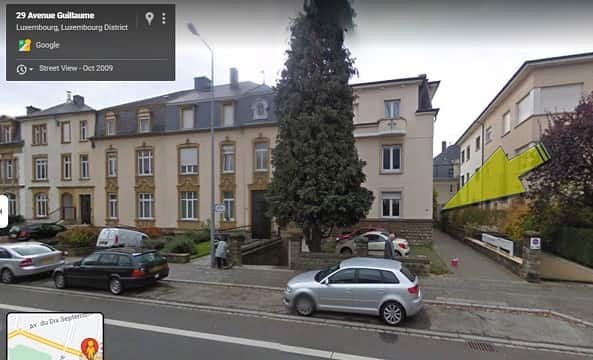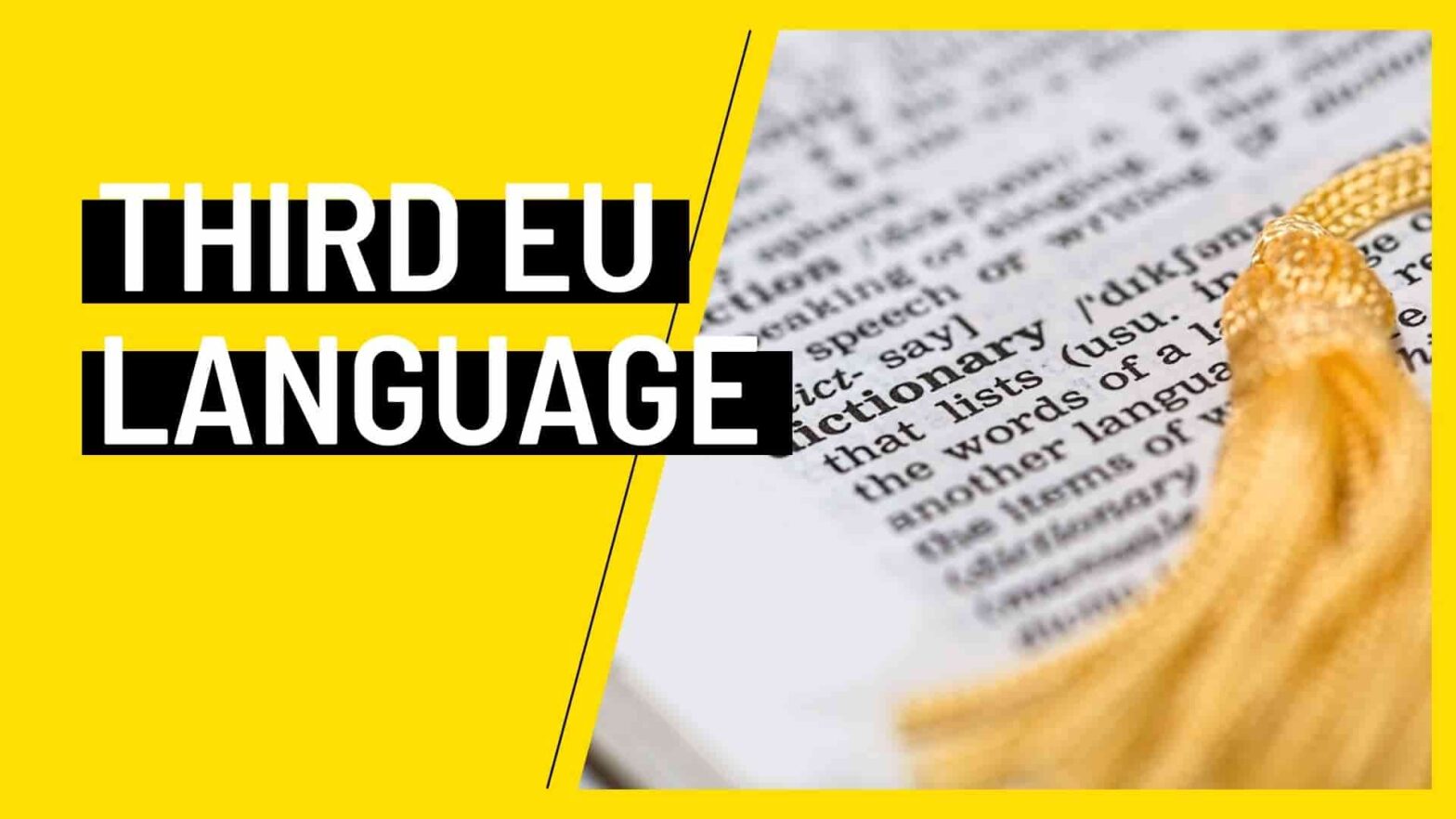One of the conditions to get a job at the European Commission or another institution of the European Union is to have the working knowledge of two EU languages. For most people these are their native language and English, French or German. However, in order to get promoted within the same institution or to keep working for a longer time and to get an indefinite contract, you will have to prove the working knowledge of a third EU language (in French – Évaluation de la capacité à travailler dans une troisième langue).
The working knowledge of a third EU language must be proven before promotion, for example, from one grade to another. It is also necessary before your second contract extension that entitles you to an ‘indefinite contract’.
Regarding indefinite contracts:
- For Administrators (AD5-AD16) and Assistants (AST1-11) this means that you will have to undergo a language exam no later than before 10 years of employment as your first contract is usually 5 years, second also for 5 years, after which you can become ‘indefinitely’ employed.
- For Contract Agents in function group IV (FG IV), if the institution practices indefinite contracts, you will have to undergo the EU 3rd language exam just before the six years mark (first contract 3 years, second contract 3 years, third contract for an indefinite period). There can be exceptions that shorten the amount of time to learn a language, for example, if you are a project staff member and the project cycles are shorter than regular contract periods. There can be a situation where you need to prove your 3rd EU language skills after 3 years or less, for example, if a project you’re engaged in is implemented in very short segments.
Contract agents in the function groups I-III (FG I, FG II, and FG III) do not have to prove the working knowledge of a third EU language.
What level of language skills is required?
You will have to prove working knowledge of a third EU language at the B2 level according to the Common European Framework of Reference for Languages, also known as CEFRL (Wikipedia link).
According to CEFRL methodology, mastery of a language at B2 level means that you can:
- understand the main ideas of complex text on both concrete and abstract topics, including technical discussions in their field of specialization.
- interact with a degree of fluency and spontaneity that makes regular interaction with native speakers quite possible without strain for either party.
- produce clear, detailed text on a wide range of subjects and explain a viewpoint on a topical issue giving the advantages and disadvantages of various options.
You will find the complete CEFRL common reference levels table at the end of this article.
What happens if I do not have the necessary EU language at B2 level?
If you do not have the proof of having a third EU language at the B2 level at the required time before your second contract extension, you will be dismissed. You will not be able to stay in the current position. Plain and simple.
In case you think you will not be able to pass a language exam, you can try to get a new contract within the same or a different EU institution as that “resets the clock” on the language requirement.
Fortunately, in case you are dismissed because of missing EU language skills, you will be entitled to the European Commission unemployment allowance.
What counts as proof of a third EU language?
There are multiple ways of showing that you possess ‘working knowledge of a third EU language’.
- A native language of a person is accepted as a valid EU language, usually attested just by proof of citizenship (passport, etc.). Here dual nationality is very useful, as this allows one to prove mastery of two EU languages at once.
- Bachelors or master’s diploma if studies were fully or to a significant amount carried out in a particular language and the person successfully graduated. The diploma will have to be recognized EPSO, and this process might take up to half a year.
- Language test certificate at B2 level from an institution recognized by EPSO.
Which are the official EU languages?
The following are the official EU languages: Bulgarian, Croatian, Czech, Danish, Dutch, English, Estonian, Finnish, French, German, Greek, Hungarian, Irish, Italian, Latvian, Lithuanian, Maltese, Polish, Portuguese, Romanian, Slovak, Slovenian, Spanish and Swedish. This list comes from article 55 of the Treaty on European Union.
According to the European Commission, English continues to be counted as an official EU language despite Brexit. This is because English has been enshrined in EU legal documents as one of the official and working languages of the EU institutions, and because it is also one of the official languages of Ireland and Malta.
Do non-EU languages count?
Unfortunately, no, non-EU languages do not count as the required 3rd working language. This is despite the fact that such languages as Russian, Arabic, and Chinese might be directly required or useful for your work. As the EU wants to promote multilingualism in the EU institutions, only the official languages of EU member states are officially recognized.
What if I fail the EU 3rd working language exam?
Unless your promotion or the 2nd contract prolongation is shortly due, there are no consequences of failing a language exam.
In fact, as soon as you feel that your third EU language skill is more or less at the necessary level for a B2 exam, sign up for a language test. Even if you fail it, you will not only find out where your weaknesses are, but you will also become acquainted with how the tests are run and what to pay attention to better prepare for the next test.
In EU institutions learning a 3rd EU language and the associated testing costs are covered as part of the employees’ benefits package. Also – if you opt to take a test in person and need to go to a different country, that will count as an administrative work mission. This means that your institution will pay not only for the flight/train/car, but also for accommodation and pay you the daily subsistence allowance.
There are no limits on how frequently you may take the language test, and get the associated costs reimbursed.
What to expect from a B2 level third EU language test?
Which EU language tests are recognized?
EPSO recognizes test results from a number of institutions for each EU language. However, there is also the option to undergo the test at a certified EPSO testing center in Brussels or Luxembourg.
There should be no substantive differences between the way tests are done at a language center and an EPSO testing center. However, there is a benefit of doing the language test at an EPSO-accredited facility. It can take around 3-4 months for language tests done outside EPSO to be recognized by the EU testing institution. If you do your language test at an EPSO-accredited facility, your test results will be ready and recognized in around one month.
The remaining article will be about the B2 EU working language tests at EPSO-accredited facilities/language schools as that is what I have had experience with.
Structure of the B2 level third EU working language test
The EU language tests at various languages schools and EPSO facilities usually have five parts: reading, listening, grammar, writing, oral. At EPSO test facilities the parts are weighed as follows.
The maximum score for the test at an EPSO facility is 100 points:
- Reading – 10 points.
- Listening – 15 points.
- Grammar – 15 points.
- Writing – 30 points.
- Oral – 30 points.
You need to score at least 60 points in total to pass. There appear to be no minimum points for each part.
Physical vs remote test attendance
Due to the SARS-CoV-2 pandemic EPSO has introduced remote testing. However, carefully evaluate the following paragraphs before you opt for the remote test option over the in-person test.
While the remote test sounds good on paper, from my personal and various colleagues’ experience there are a number of drawbacks:
- Technical difficulties at EPSO’s end were reported by a number of people, which in some cases necessitated a repeat test.
- Staff managing the online test environment seem to not always be completely aware of how to run the system. You cannot count on technical support.
- You might be required to install some software on your computer which might be a problem if you only have a work computer.
- You are required to turn on your camera and show around your home or the place from where you are taking the test to prove that you are not receiving any assistance.
- If you are a “people’s person”, the test environment may seem very sterile and technical adding to psychological stress.
- Some languages have specialized keyboards/characters that are not available on the default English keyboards. Even if you are able to install the necessary Microsoft software language pack, the remote language test might not be the best place where to try to find out which special character hides under which keyboard button. If you decide to take the remote test, be sure to also get the appropriate physical keyboard (this definitively applies to French, German, Polish and a number of other EU languages).
In short, if you have the time, I suggest to go for the in-person test in Brussels or Luxembourg.
Tips
Here is a collection of tips from myself and other people that you might find useful in various stages of preparing and going for the test:
- External language courses vs in-house classes. If your workload allows, enroll in in-house languages classes for your 3rd EU language every semester. However, once you decide to take the test, consider requesting external individual language instruction. This allows for more intensive training, tailored to your needs and addressing any gaps or deficiencies you have. Both types of language training are paid by your institution, however, for the external training you will have to advance funds and will be reimbursed after completing a particular agreed segment of training.
- When to take the test? Many staff of EU institutions make the mistake of postponing their 3rd EU language test until shortly before their promotion or contract extension to an indefinite period. A better strategy is to take the test when you are in your “prime”, e.g., immediately after you have finished studying a language at B1 or B2 level. This will not only ensure that the skills are fresh at the forefront of your mind, but that you can re-take the test if you happen to fail the first exam.
- Focus on your weaknesses. If a particular language skill is underdeveloped, think of ways to reinforce it in addition to language classes. For example, if your weak spot is speaking, ask a colleague who is a native-speaker only to converse with you in your third EU language, find a person in your institution or online with whom you can do language “exchanges” (meet regularly and half the meeting speak in your native language, half in the colleague’s). If your weakness is listening and comprehension, make it a habit to consume popular culture content in the required language, e.g., Netflix shows in French, German or Spanish.
Sample tests
If you are interested in finding out what your test might look like, here are some sample online tests:
- Mock EPSO B2 language test in English by the TELC GmbH, a subsidiary of the German Adult Education Association (DVV). Another sample B2 language test in English by Tracktest.
- Information about a sample B2 language test in French (DELF); another sample French test, and one more French sample test.
- Goethe Institut sample B2 German test materials. Another good sample B2 language test in German. I also recommend you take a look at this excellent Reddit thread on B2 German language exams.
- Sample B2 language test in Spanish by DELE.
My experience of what it’s like
The next section will cover my experience of taking the B2 language test in the EPSO test center in Luxembourg in 2021.
Arriving at the test center
EPSO recommends arriving at the test center 30 minutes before the test starts. While half an hour is clearly too much, do not arrive precisely on time as you have to undress, your ID documents need to be checked, and you might want to visit the loo and get a glass of water.

Finding the test center is easy. It’s a building right next to the pavement with a side entrance. You can follow Google Maps without any difficulties.
There are numerous public bus stops that are 1-5 minutes away depending on where your hotel is located. I chose to arrive on foot from my hotel; if you do the same and take a route in the valley, have some extra time in case you can’t find a bridge to cross the river right away.
Language test parts – experience and tips
00 | Overall impression
As I hadn’t taken a language test in many years, I was quite worried about how difficult the test would be, particularly the grammar and writing parts. Afterall, the B2 level in my perception should already be one where the person demonstrates very good proficiency in a language and comfort with all aspects of using it.
In order to decrease my worries, I spoke to several colleagues and acquaintances who had taken a B2 language test in 2021 and earlier. Their overall message – the EPSO B2 language test was in fact easier than expected irrespective of the language it’s taken in.
01 | Reading
In this, the initial part of the language test, you are given a text to read, and then complete two tasks.
The first task is an MCT or multiple choice test with four fact-like answers, out of which you have to choose one. Two of the answers can be eliminated easily, but for the other two it can at times be tricky. If unsure, go back and consult the text.
For the second task, based on the initial text, you are given four statements and you have to chose the one that best applies to the text. Here, again, two options can be eliminated easily, but the other two can be very tricky. For example, the two possible options might not match the text completely but to a varying degree, say, one is 70% appropriate, and the other is around 85%. Due to the stress in the test environment it’s not that easy to choose the best option.
Tips.
- If you are not certain about an answer, do not hesitate to go back and check the text.
- You are supposed to use only the information provided in the text; do not rely on any external knowledge you might have about the topic.
- If unsure, make a choice and move on. If you have time at the end of this part, revisit the particular question and give it another thought.
02 | Listening
In the listening par tone is also given two tasks. At first you get a longer audio sample that is replayed twice. My first task was about a general popular science topic. Already at the start of the first replay, you are free to mark your answers sheet or make notes. After the second reply you have around 5-10 minutes to choose the right answer from a multiple choice test that quizzes you about statements and facts in the story.
After this you will listen to a second recording that will be replayed only once. This recording was about a social everyday situation. After this recording you have to choose the correct statement from a number of options.
While listening was not the hardest part to of the test for me (grammar and writing was), this was probably the most tricky one due to the fact that you cannot re-listen to the story beyond the one or two initial playbacks. If you fail to note something down, you’ll have to rely on your memory or a lucky guess.
Tips
- If you are given this option, try to read through the provided answer options ahead of playback of one or both recordings. Immediately try to note down if there’s something specific like facts or quantitative details that you have to pay attention to during the recordings.
- Don’t try to note right answers from the start. Rather, make quick notes about details in the story so that it’s easier to remember.
- Pay particular attention and note all quantitative information, for example, whether something happened in 1954 instead of 1945, or the temperature of something was 38.9 degrees instead of 39.8 degrees Celsius.
03 | Grammar
The grammar section was the shortest of all parts of the test. In my exam I was just given around eight sentences and had to properly conjugate verbs to fit the sentence.
I don’t even have any particular tips about this section. It’s mostly about checking whether you know the basics or not.
04 | Writing
For the writing part you are usually given two options to choose from. Read through both and choose with which described situation you feel most comfortable with.
Usually, you are presented with a problem situation, described in 3-4 paragraphs. You are then required to write a letter or an email to your supervisor or someone higher up the hierarchy, and inform them about the particular problem and propose a solution for their approval.
Tips.
- Choose one of the offered topics and stick with it. While there is enough time to produce the required written response (if I remember correctly, it was about 40 minutes), the time allotted might not be enough if you decide to switch to the other topic mid-way.
- My experience and that of my colleagues is that you are given at least half of the text of your written exam in the text of the task. It is up to you to skilfully peruse it and add some content by yourself.
- Use the notes paper given to you. Spend 5-10 minutes thinking about your response, and sketch an outline of what you want to write, including any vocabulary or synonyms of used words you might want to include.
- Creativity is not the main aim of this exercise. Rather, try to put emphasis on a) clear responses to any questions given, b) having a clear response structure (introduction, description of problem, proposed solution, cordial beginning and end of the letter or email, etc.), c) demonstrating your vocabulary.
05 | Oral
For the oral test you are given a choice of 6 “tickets”. You are not informed which topics are on the tickets, and have to take one at random.
After you take your ticket, you are given 5 minutes to collect your thoughts. Following that:
- You are at first expected to talk for 5 minutes or so by yourself and share your thoughts about the particular topic.
- After your monologue, you are engaged in a conversation by the assessor who will ask you questions to which you can respond as you see fit.
Tips. During the 5 preparatory minutes do not only think about the topic, but use the note paper and make a plan for your 5 minutes of monologue. Note down the starting sentence, create a structure for the rest of the intervention, etc. I would also recommend to make a list of words that you want to use to show off your vocabulary, or words with which you have difficulty with, so that you don’t forget them. I also realized that there are some words which I know in English, but which I could not recall right away in my chosen third language, so I used the time to remember their translations.
For the conversation part I would recommend the following:
- Pay attention to the question content and structure. This will give you at least 50% of your response.
- Try to appear and be calm, show that you have command of the language. Do not shy away from taking pauses to think your responses over a bit. I would say that it’s better to produce a decent answer with a delay, rather than mumble something.
- Reuse vocabulary and sentences you used in the first “monologue” part, as you will be talking about the same subject.
Logistics tips
Buses. Since several years ago Luxembourg has introduced free public transport, also for foreign visitors. This makes moving around the capital city and the country even more comfortable. I can highly recommend the bus transit system in Luxembourg as the busses are very clean, run on time and quite frequently.
Taxi. If you arrive in Luxembourg airport late in the evening, you might be required to take a taxi to the city centre or location of your hotel. While your EU institution will most likely reimburse these costs due to late plane arrival, bear in mind that taxis in Luxembourg are quite expensive. I took a 10-minute ride to my hotel and it cost me 58 Euros. While the taxi service at the airport appeared to be well regulated, be sure to ask if the particular taxi can provide you with a receipt for the ride. While most taxis advertise that they accept payment cards, be sure to check before the ride if the particular vehicle’s card reader is functional.
Hotels and other accomodation. To avoid unnecessary stress and save time on the day of your test, I would recommend to stay close to the testing centre on 29 Avenue Guillaume.
Background information
CEFRL common reference levels
| Level | Description |
| Basic user A1 | Can understand and use familiar everyday expressions and very basic phrases aimed at the satisfaction of needs of a concrete type. Can introduce themselves and others and can ask and answer questions about personal details such as where they live, people they know and things they have. Can interact in a simple way provided the other person talks slowly and clearly and is prepared to help. |
| Basic user A2 | Can understand sentences and frequently used expressions related to areas of most immediate relevance (e.g. very basic personal and family information, shopping, local geography, employment). Can communicate in simple and routine tasks requiring a simple and direct exchange of information on familiar and routine matters. Can describe in simple terms aspects of their background, immediate environment and matters in areas of immediate need. |
| Independent user B1 | Can understand the main points of clear standard input on familiar matters regularly encountered in work, school, leisure, etc. Can deal with most situations likely to arise while travelling in an area where the language is spoken. Can produce simple connected text on topics that are familiar or of personal interest. Can describe experiences and events, dreams, hopes and ambitions and briefly give reasons and explanations for opinions and plans. |
| Independent user B2 | Can understand the main ideas of complex text on both concrete and abstract topics, including technical discussions in their field of specialization. Can interact with a degree of fluency and spontaneity that makes regular interaction with native speakers quite possible without strain for either party. Can produce clear, detailed text on a wide range of subjects and explain a viewpoint on a topical issue giving the advantages and disadvantages of various options. |
| Proficient user C1 | Can understand a wide range of demanding, longer clauses and recognize implicit meaning. Can express ideas fluently and spontaneously without much obvious searching for expressions. Can use language flexibly and effectively for social, academic and professional purposes. Can produce clear, well-structured, detailed text on complex subjects, showing controlled use of organisational patterns, connectors and cohesive devices. |
| Proficient user C2 | Can understand with ease virtually everything heard or read. Can summarize information from different spoken and written sources, reconstructing arguments and accounts in a coherent presentation. Can express themselves spontaneously, very fluently and precisely, differentiating finer shades of meaning even in the most complex situations. |
Legal notes
Requirement to be able to work in at least two EU languages is mentioned in Article 28(f) of the Staff Regulations.
An official may be appointed only on condition that:
[…]
(f) he produces evidence of a thorough knowledge of one of the languages of the Union and of a satisfactory knowledge of another language of the Union to the extent necessary for the performance of his duties.
Assessment of the capacity to work in a third EU language is mentioned in article 45(2) of the Staff Regulations.
Officials shall be required to demonstrate before their first promotion after recruitment the ability to work in a third language among those referred to in Article 55(1) of the Treaty on European Union. The appointing authorities of the institutions shall adopt common rules by agreement between them for implementing this paragraph. These rules shall require access to training for officials in a third language and lay down the detailed arrangements for the assessment of officials’ ability to work in a third language, in accordance with Article 7(2)(d) of Annex III.
Do you have question or suggestion for this article? Please share in a comment below and let’s make this resource better for you and other readers!







9 responses to “Explainer on ‘Working knowledge of a third EU language’”
Hello, I have a question concerning timing 🙂 I could be eligible for promotion next year, and I will finish level 5 this june. So, do I have to enrole and pass level 6 during the summer intensive module, or can I enrole in regular language class at my institution in Septmeber and pass the level 6 exam in February?
Thank you
to be honest this is crazy.
I mean a need to get a 3rd language that is probably is useless in your day to day work or life. I mean, is it not about time to reform that? and allow people to train in skills that matter.
Maybe we need to have an equivalent of DOGE (Department of Government Efficiency) type to review and scrutinize some outdated regulations.
Dear Ben,
Thank you very much for this article 🙂
I have a question similar to the previous comment as I also got les than 10 years ago the French DELF B2 certificate. This certificate according to the French Ministry of Education is valid for life, but I wonder whether EPSO has a different approach on the validity of the certificates.
Thank you in advance for your views.
Usually EPSO respects the certificate validity as indicated by the issuing institution. If you have such certificate, ask your EU institution’s HR to send it to EPSO as soon as possible. The recognition procedure usually takes around 3 months (can be expedited in urgent cases). Try to get clarity as soon as possible so you know whether you have to take the a language test for the 3rd EU language or not.
Could you share with me the legal basis or case law on which a language is accepted purely based on citizenship/nationality?
Thank you
In the following sentence: “The grammar section was the shorted of all parts of the test.” you probably meant “the shortest”?
BTW, thanks for a very informative and helpful article.
Adam, thanks for spotting the typo. Corrected now.
Great website Ben !
1st q: I passed the Cambridge CAE test, which is equivalent to the C1 CEFRL grade, but it was back in 2003.
Do the European Institutions have some time limitations about when the certificate was awarded?
2nd q: If I want to apply to a position where is advertised “The main working languages of the unit are English and French: C2, B1”, does this mean I have to provide proof of language tests for both? In the JD it does not say anything else about French as mandatory. The job is in Bruxelles.
All the best!
Dear Evian, thanks for the words of appreciation!
Q1. Usually an expired certificate appears not to be a problem, however, you can always stumble on a particularly diligent HR person. My experience is that everyone uses common sense and if you obtained a certificate for C1, it’s highly unlikely that your language skills have evaporated in thin air over the years.
Also, a number of other things are accepted as proof of language skills besides “native language” and language school certificates. These are having studied in a university with a particular language of instruction, or even just having succesfully passed university courses in a language. In the latter case these might have to recognized by a special EPSO committee (your institution’s HR will address EPSO on your behalf).
Q.2. Nominally you can only be evaluated during the selection process on the criteria that are listed in the vancancy notice. If French is not a precondition for employment, you should not get penalized in the evaluation points tally. On the other hand, if its a required language, hard to get around this unless the competition is very weak/you are a strong candidate in most other areas important to the employer.